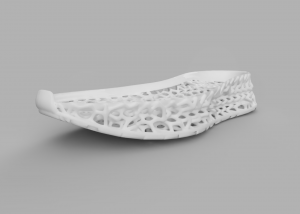
Covestro’s presence at the virtual trade fair Formnext Connect 2020 is entirely dedicated to the Circular Economy. The company will be presenting products made from alternative raw materials, such as recycled plastics and CO₂-based cardyon® brand products which will contribute to the development of the 3D printing industry to become more circular.
This adds yet another sustainability aspect to the well-known ecological benefits of additive manufacturing – decentralized production, demand-driven manufacturing and lower waste. Covestro will also provide an outlook to a versatile range of Addigy® materials for common 3D printing processes at Formnext Connect. The developments will be presented in an interactive expert session in the virtual Covestro studio on November 10, starting at 11:00 a.m.
“Nowadays, superior manufacturing technologies are no longer enough to produce truly sustainable products,” says Patrick Rosso, Global Head of Additive Manufacturing at Covestro. “We want to boost the circularity of our products while preserving their excellent properties. That’s why we are currently developing new, more sustainable products which are already in the testing phase.”
Sustainable portfolio expansion
These include, for example, pellets and filaments made of partially recycled plastics. Some of the raw materials for the recycled plastics are post-industrial waste from Covestro’s manufacturing facilities and can be used as filaments for 3D printing after reworking. One of the products developed from recycled plastic is a polycarbonate blend and, like other polycarbonate-based materials, is suitable for applications that require a high temperature resistance.
Equally promising as building blocks for sustainable 3D printing products are polyols of the cardyon® brand, in which CO₂ replaces some of the petrochemical raw materials previously used. These can for example be used to produce thermoplastic polyurethanes (TPU), which can be used as powders or filaments in additive manufacturing.
In addition, Covestro is currently developing partially bio-based products for 3D printing, in which almost 50 percent of the carbon content is derived from biomass. One such material has already been used to print a shoe insole using selective laser sintering (SLS). TPUs generally contribute to increased sustainability in powder-based 3D printing processes, as up to 100 percent of the non-sintered powder can be reused in the process due to the low build room temperature.
Marketing Manager Katinka Honervogt welcomes the portfolio expansion: “With the new products, we are well positioned to meet the ever-increasing demand for sustainable materials for various applications, industries and printing processes. At the same time, the expansion fully reflects Covestro´s strong focus on Circular Economy.”
The Circular Economy as a global guiding principle
With a strategic program, Covestro wants to fully support principles of Circular Economy. In doing so, the company aims to accelerate the change towards circularity, especially in the chemical and plastics industry, and contribute to the goal of a greenhouse gas-neutral economy. The focus is on using alternative raw materials, developing innovative and efficient recycling technologies, cross-sector cooperation with partners and the use of renewable energies. Covestro has been active in the development of raw materials from biomass, CO₂ and waste for several years.
The additive manufacturing of plastic parts is carried out sustainably and efficiently by automated processes. This manufacturing method generates less waste than conventional production processes, especially when printing more complex structures. Small 3D printers – compared to traditional manufacturing units – allow parts to be produced locally anywhere in the world, saving on transportation costs. On-demand production reduces waste and stock levels. Considering the development of new materials based on alternative raw materials, additive manufacturing also offers enormous potential for contributing to full recyclability and closing material cycles in the future.
About Covestro
With sales of EUR 12.4 billion in 2019, Covestro is among the world’s largest polymer companies. Business activities are focused on the manufacture of high-tech polymer materials and the development of innovative solutions for products used in many areas of daily life. The main industries served are the automotive, construction, wood processing and furniture, and electrical and electronics industries. Other sectors include sports and leisure, cosmetics, healthcare and the chemical industry itself. Covestro has 30 production sites worldwide and employs approximately 17,200 people (calculated as full-time equivalents) as of the end of 2019.
Source
Covestro, press release, 2020-11-02.
Supplier
Share
Renewable Carbon News – Daily Newsletter
Subscribe to our daily email newsletter – the world's leading newsletter on renewable materials and chemicals









